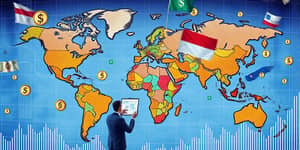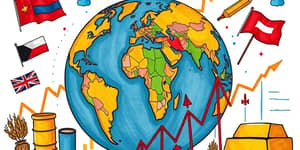
In today’s rapidly evolving economic landscape, the connection between knowledge and prosperity has never been clearer. Household wealth is not solely determined by income; it is profoundly influenced by an individual’s grasp of financial concepts.
Recent studies from Europe, the United States, and India underscore how financial literacy fuels smarter decisions, leading to impressive wealth accumulation and more resilient households. This article explores these insights and offers practical guidance for readers to elevate their own financial well-being.
Data from Europe highlights a strong, non-linear correlation between financial literacy and net worth. Those in the top literacy quartile report a median net worth of €185,900—four times that of the least literate group, at €46,700. This gap demonstrates that basic knowledge can translate into substantial asset growth over time.
In the United States, median household net worth climbed from $120,000 in 2016 to $193,000 in 2022, a 61% increase driven by rising home values, stock market gains, and enhanced savings strategies. Remarkably, the bottom 25% of households saw a 2,814% surge in wealth, often through diligent debt repayment and initial asset accumulation.
These figures show that even modest improvements in financial understanding can yield compounding returns on investments, debt management, and retirement planning. Households equipped with financial know-how are more adept at navigating market fluctuations, securing their future and reducing stress.
One of the clearest manifestations of literacy’s impact is asset diversification. European families with high financial literacy are significantly more likely to own homes, stocks, mutual funds, and bonds. By contrast, lower-literacy households often limit themselves to home ownership, missing out on the powerful growth potential of financial markets.
In the U.S., the rise in net worth between 2016 and 2022 owes much to stock market participation and retirement accounts. Households that understand the principles of risk tolerance, asset allocation, and market cycles tend to build more robust portfolios, ensuring they benefit from both bull runs and downturn recoveries.
This behavior reflects the role of literacy in promoting informed risk-taking—a willingness to venture beyond traditional savings and into higher-yield assets. Financially literate individuals also rebalance their portfolios, safeguard against inflation, and adapt to changing economic climates.
International evidence from India illustrates how formal education reduces financial illiteracy. Among Indian graduates, 29.6% exhibit high financial literacy, compared to a mere 0.12% among illiterates. Overall, 43.2% of those with no formal schooling are financially illiterate, while only 5% of graduates fall into that category.
These statistics reveal that education and financial literacy go hand in hand. Schooling not only imparts general skills but also fosters habits of research, critical thinking, and lifelong learning—qualities crucial for sound financial decision-making.
Improving educational access and integrating financial topics into curricula can therefore have a profound effect on wealth distribution. By equipping younger generations with foundational money management skills, societies can promote empowered, self-reliant citizens who navigate economic challenges with confidence.
While data reveals stark disparities, it also highlights actionable opportunities for change. Governments, schools, and community groups can implement targeted programs, but individual initiative remains paramount.
Here are practical steps to foster your own financial growth:
By taking these steps, you can transform abstract concepts into real-world gains—reducing stress, securing your future, and contributing to broader economic stability.
Financial literacy is more than a personal asset; it is a cornerstone of societal resilience. As nations grapple with widening wealth gaps and economic uncertainty, empowering citizens with knowledge can foster inclusive growth.
From urban centers to rural communities, the ripple effects of better financial education include stronger retirement security, lower debt burdens, and enhanced well-being. Each step toward literacy not only improves individual fortunes but also builds a foundation for collective prosperity.
Embrace this journey of learning and application. Every article read, every course completed, and every dollar invested wisely moves you closer to financial freedom. In doing so, you become part of a global movement, unlocking opportunities for yourself and future generations alike.













